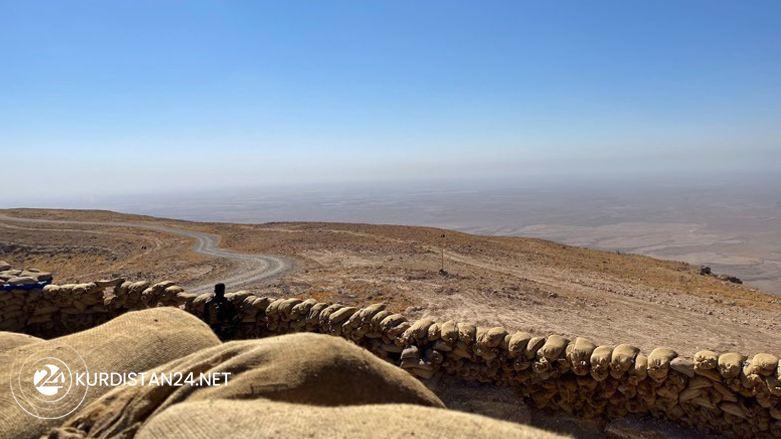ISIS continues to threaten disputed town of Makhmour

ERBIL (Kurdistan 24) – The lives of civilians in the town of Makhmour continue to be threatened by Islamic State (ISIS) militants operating from security gaps in the disputed territories between Iraq and the Kurdistan Region.
Following the bloody rise of ISIS in 2014, the Peshmerga held their front line positions in those areas disputed between Erbil and Baghdad, including Makhmour.
Thousands of Iraqi troops were allowed into Makhmour by Kurdish Peshmerga forces in early 2016 for the offensive on Mosul, which ended in July 2017.
However, security in those regions deteriorated significantly after Iraqi forces and the Iran-backed Popular Mobilization Units (PMF) paramilitaries seized Kirkuk and other disputed territories from the Peshmerga in October 2017, a month after the Kurdistan Region's September 2017 independence referendum.
Since then, there have been security gaps between the positions held by the Peshmerga stationed near the Qarachukh mountains and the Iraqi Army. In some areas, these gaps are 3-5 kilometers wide. The US-led anti-ISIS coalition calls the area the Kurdish Coordination Line.
Col. Srood Salih, a Peshmerga commander in Sector 6, told Kurdistan 24 earlier this week that ISIS continues to threaten Makhmour.
"They continue to kidnap people and take money to show that they are still present," he said.

He also said most of the Kurdish villages outside of the town of Makhmour were emptied after Iraqi forces came to the area.
"Some of the elderly people are still staying in the villages, but most left because ISIS came to these places," Col. Salih added. "Last year, they set agricultural fields on fire since they (villagers) were not ready to pay zakat (Islamic tax) to them."
Read More: ISIS threatens to burn Makhmour farmers' grain fields if they fail to pay' taxes'
Kamaran Palani, a Research Fellow, MERI (Middle East Research Institute), said that most Kurdish civilians do not want to live in these areas "when no one protects them."
"Almost all of them left, and I consider this another form of Arabization of the area, caused by the violence and threat of ISIS," Palani, who is originally from Makhmour, told Kurdistan 24.
"People in these areas, especially in Makhmour, feel vulnerable,” he said. “They don't feel protected by security forces."
ISIS continues to collect a lot of money from civilians and also kidnaps people, especially from rich families.
"There is very little cooperation between people and security forces or joint cooperation between Kurdish and Iraqi security forces," Palani added.
Villages near the Makhmour mountains have become a base of operations for ISIS remnants, Middle East Eye reported on Oct. 18. That report documented how ISIS harasses civilians in the village of Liheban.
"We called the Peshmerga to come and help us, but they said 'we need an order, we have to contact the Iraqi forces, we cannot come just like that,'" Mohammed Hassan, a villager whose village was raided by ISIS, told the outlet.

Most of the ISIS fighters in the area are reportedly local. Their numbers have also increased recently. They are commanded by an ISIS emir (senior leader) from the town of Hawija in Kirkuk province.
Iraqi and Iran-backed paramilitary forces captured Hawija from ISIS in Oct. 2017. But some say the area was not completely cleared of ISIS militants, who simply shaved their beards and went underground to fight another day.
Since then, southern Kirkuk has suffered from ISIS attacks. Two Peshmerga were killed in the disputed province near the town of Pirde on Saturday night.
The Ministry of Peshmerga, the Iraqi Army, and the US-led coalition are discussing plans to form and deploy two joint Iraqi-Peshmerga brigades to secure the disputed territories and patrol inside the security gaps.
Read More: Peshmerga, US delegation talk formation of 'joint brigades' with Iraqi Army
Peshmerga Col. Salih believes the best solution is for the Iraqi and Kurdish forces to fight ISIS together.
"The best solution is if our forces and Iraqi forces come closer together, but if they make mixed brigades, it's a good solution too," he said.
"We know they are having discussions (on a higher level), but we as Peshmerga are just following orders,” he added. “Until now, we have no orders.”
Kurdistan Region Prime Minister Masrour Barzani also underlined the importance of continued coordination between the Kurdistan Regional Government (KRG) and the federal government against ISIS following the Saturday night attack near Pirde.
According to Palani, there is almost no cooperation between Kurdish and Iraqi forces.
"They just share information with each other. There is basically no cooperation on the ground," he said.
In Palani's view, a joint Peshmerga-Iraqi force won't make much difference on the ground since the Peshmerga presence in the security gaps is limited.
"The solution is to have more local forces and more cooperation and to allow the return of the Kurdish administration to Makhmour (that controlled the area before 2017), not only security forces," he said.
"It's not just about the Peshmerga going back, but also the administration. There is a need for not only a security solution but also an administrative solution."
The US-led coalition also provides supporting airstrikes to the Peshmerga forces when ISIS movements are detected, Col. Salih said.
"We give the location to the operation center in the airport (in Erbil), and they give coordinates to the coalition (for airstrikes)," he said.
However, there have been no airstrikes by the coalition in the area in the last few weeks.
